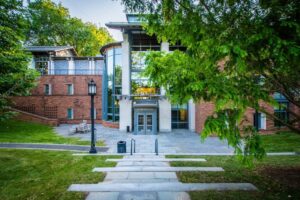Alexandra Boursican ’23
Business Manager
Tia Wurzrainer ’24
Contributing Writer
Chase Oatis and Crystal Nieves ’08 M’09 have been named as finalists for the vacant Director of LGBTQ+ Life position. A “meet the candidate” event organized by the search committee was held on Monday, Oct. 18 for Oatis and Tuesday, Oct. 19 for Nieves. The search committee consisted of Vice President for Diversity, Equity, and Inclusion Anita Davis (Chair); Cultural House Supervisor Jared Delane; Associate Professor of Anthropology and Religious Studies Timothy Landry; and students Emma Hersom ’24 and Hendrick Xiong-Calmes ’22.
The Oct. 18 meeting commenced with a fifteen-minute presentation from Oatis in which he gave a summary of his previous training and outlined plans he would like to implement at Trinity. Oatis spent a considerable amount of time explaining that he understood that the concept of pronouns can be complicated to comprehend. He believes simple activities such as describing a fictional character without using gendered language can help students familiarize themselves with the concept. Oatis’s primary goal is to help students with campus resources–whether that be the Queer Resource Center, all-gender restrooms, or helping students with primary name changes. He strives to foster a community where there is more visibility for the LGBTQ+ community as well as to continue to educate faculty and staff.
After the presentation, Oatis opened the floor for questions. Residential Learning Coordinator Veronica Hills asked Oatis how he would keep the campus educated on different topics. Oatis responded that he would provide students with the tools to understand and be supportive of matters relating to the LGBTQ+ community. A student asked Oatis if he had plans to host events for queer people to provide them with visibility on campus, especially black queer members. He responded by saying that a big part of his plan to address situations like these is to ask students what they would like to see in their community. He also acknowledged that he would have to prove himself to be an ally to the black queer community as a white staff member.
International Student Advisor Katherine Clair asked Oatis how he would address the intersection between international and LGBTQ+ students with special attention to students that come from conservative countries. Oatis acknowledged that queer language is a very westernized concept; he brought up the idea of communication and how he would want to speak with international students about the topic.
Hills ended the meeting with one final question for Oatis about why he thinks LGBTQ+ students do not use Title IX when incidents occur. He explained that it would be important for him to build relationships with faculty in those offices as well as open up a conversation with students to understand the reason why they are not using these resources through student group meetings.
The Oct. 19 meeting for was conducted in an identical fashion for Nieves, with a presentation followed by a question-and-answer period. Nieves received both a B.A. and M.A. in Public Policy from Trinity College, and she currently runs Trinity’s Queer Resource Center, according to her LinkedIn profile.
Nieves would like to create space for learning and in doing so she has three key principles: 1) Speak from your own experiences and use “I” statements to avoid a person having to take responsibility for an entire group of people; 2) Strive to be accountable; acknowledge, apologize, learn, apply; 3) Participation is wonderful; take space and make space; and 4) What’s said here stays here but take what you learn with you. Nieves also emphasized intersectionality as an extremely important part of the LGBTQ+ community, wanting to help people understand that it is not one community but rather many communities. She explained that without intersectionality, experiences can quickly become invisible. Nieves wants to create intentional spaces and programs for LGBTQ+ students of color, faith, and different ethnic backgrounds to help promote a more holistic conversation and understanding.
After her presentation, Nieves was asked a series of questions from students, faculty, and staff. The first question asked her how she would create spaces connecting the LGBTQ+ communities of Hartford with those on Trinity’s campus. She named the importance of being connected with the broader community and cited how beneficial those interactions would be for Trinity students, providing them with more resources. When answering this question, she stated that it is “important that the only community you know is not just the Trinity community,” a sentiment that can be applied to all aspects of campus.
Furthermore, Nieves was asked how she would educate the campus on language and Queer Education, and how she would react to the homophobic slurs and incidents that take place on campus. Nieves responded that this should be done through tabling campaigns and programming with clubs. She emphasized that language is always changing, and it is best to do what’s best for the individual. In response to how she would react to the homophobic slurs and incidents on Trinity’s campus, Nieves wants students to understand the nature of those incidents and ensure that students understand the severity. She explained that the results of these incidents will be traumatic no matter what, and that it is vital to create safe spaces and offer support from the counseling center for those individuals. Nieves wants the administration to be more active in conversations about accountability and she wants everyone on campus to take responsibility for creating a safer environment.
Finally, Nieves was asked to discuss her time at Trinity, the reasons why she decided to come back, and her hopes for LGBTQ+ life on campus. When discussing her time at Trinity, Nieves stated, “I survived.” She characterized her years at Trinity as being formative, showing her what she wanted to change and how she would find the solutions to the struggles she faced on campus. While at Trinity, Nieves tried to grow a culture of allyship on campus and she would want to continue to create that culture in her new role. Nieves further intends to put students’ pronouns and preferred names on transcripts and advising records so that professors have that information from the very beginning and don’t go through the experience of misgendering a student. Additionally, she wants to build multiple communities for LGBTQ+ students because she has observed that not a lot has changed on campus since 2008.









+ There are no comments
Add yours